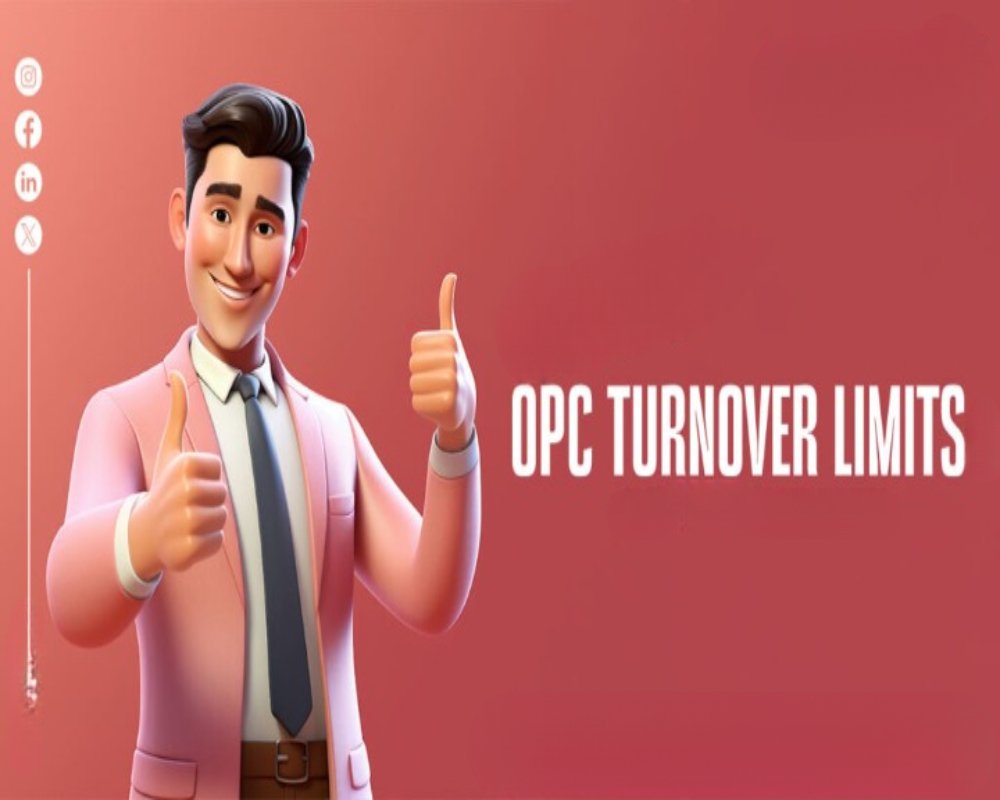Introduction
The One Person Company (OPC) structure was introduced under the Companies Act, 2013 to provide individual entrepreneurs with a simple yet formal business model. While OPCs enjoy reduced compliance burdens and full ownership control, they are designed to operate within specific financial thresholds. One such key limit is the maximum turnover limit, which, once exceeded, requires the OPC to transition into a more complex business structure. Understanding this turnover cap is crucial for entrepreneurs planning for growth, compliance, and conversion. This article outlines the defined maximum turnover limit for OPCs and its implications on business operations.
Definition of Turnover in OPC Context
Turnover refers to the gross revenue earned from the sale of goods or services during a financial year. It excludes capital receipts and focuses only on operating income. For OPCs, turnover is a benchmark to determine whether the business can continue under the same structure or must convert to a private or public limited company.
Prescribed Maximum Turnover Limit
As per Rule 6(1) of the Companies (Incorporation) Rules, 2014, if an OPC’s annual turnover exceeds ₹2 crore for any financial year, it must mandatorily convert into a private or public limited company. This rule is designed to ensure that the OPC model remains suitable only for small-scale businesses.
Monitoring Turnover for Compliance
It is the responsibility of the OPC to monitor its turnover throughout the financial year. Turnover must be computed based on the profit and loss account prepared in accordance with the provisions of the Companies Act and applicable accounting standards. Failure to recognize and act upon exceeding the threshold can result in penalties or loss of legal status.
Turnover-Based Mandatory Conversion
Once the turnover crosses ₹2 crore, the OPC must initiate the conversion process within six months. This involves altering the Memorandum and Articles of Association, changing the company structure, and filing necessary forms such as INC-5 and INC-6 with the Registrar of Companies (RoC). Non-compliance can attract fines and disqualification.
No Voluntary Conversion Within Two Years
An OPC cannot voluntarily convert into a private limited company within the first two years of incorporation, unless its turnover crosses ₹2 crore or its paid-up capital exceeds ₹50 lakh. This restriction helps ensure that OPCs are used for genuine small businesses and not as a workaround to delay full compliance requirements.
Impact on Growth and Scalability
The ₹2 crore turnover limit is a regulatory checkpoint for scaling businesses. When an OPC grows beyond this threshold, it is expected to adopt a more robust company structure that can handle larger financial responsibilities, multi-member ownership, and broader stakeholder engagement.
GST Registration and Turnover
While the Companies Act sets a ₹2 crore turnover limit for structural conversion, GST registration becomes mandatory at much lower thresholds—₹20 lakh for services and ₹40 lakh for goods in most states. Thus, an OPC may be subject to GST laws much earlier than it hits the ₹2 crore mark under company law.
Documenting Turnover in Financial Statements
Turnover must be clearly and accurately documented in the audited financial statements of the OPC. These statements form the basis for determining compliance with the turnover limit. An auditor’s report and board resolution confirming the crossing of the threshold are necessary for initiating the conversion process.
Conclusion
The maximum turnover limit of ₹2 crore plays a pivotal role in regulating the operational scope of a One Person Company. It ensures that OPCs remain a tool for small-scale entrepreneurship and that growing businesses shift to structures better suited for higher-scale operations. For an OPC, exceeding this limit is not just a financial milestone but a legal trigger that mandates structural transformation. Staying informed about this threshold helps entrepreneurs prepare in advance and ensures smooth business progression from a single-owner setup to a more expansive company model.
Hashtags
#OPCTurnoverLimit #BusinessRegulations #OnePersonCompany #OPCCompliance #StartupGuidelines #Entrepreneurship #BusinessGrowth #FinancialLimits #CompanyLaw #SmallBusinessTips #OPCFormation #LegalAdvice #BusinessStrategy #TurnoverRegulations #StartupSuccess #FinanceManagement #BusinessDevelopment #OPCInsights #CompanyTurnover #EntrepreneurTips


0 Comments